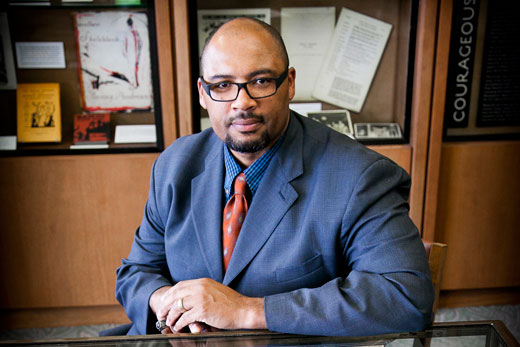Three public talks will be offered in conjunction with the National Endowment for the Humanities summer institute on black aesthetics to be held on campus July 13 through Aug. 1
Pellom McDaniels III, co-director of the NEH institute, describes its focus as being "on expanding our understanding of the significance of history and memory on the performances and reception of art produced within the context of the African diaspora and meanings relevant to 21st century definitions of blackness."
Titled "Black Aesthetics and African Centered Cultural Expressions: Sacred Systems in the Nexus between Cultural Studies, Religion and Philosophy," the institute is the first of its kind for NEH.
"The topic of black aesthetics is a first for an NEH institute. We hope to continue the research with future iterations, possibly in diasporic locations, bi-annually," says Candy Tate, project administrator at Emory College Center for Creativity and Arts.
Twenty-five college and university teachers out of 140 applicants were selected to attend the institute. The following events are open to the general public:
- "Getting Hot but Remaining Cool: Aesthetic Traditions of the Yoruba of Nigeria" will be Tuesday, July 15, at 7 p.m. in the Reception Hall of the Michael C. Carlos Museum.
Robert Farris Thompson, the Colonel John Trumbull Professor of the History of Art at Yale University, will give the talk. Thompson is considered one of the seminal influences on the field of research related to retaining cultural, religious and social elements in art found throughout the African diaspora.
- "A Black Visual Art Aesthetic," a public panel discussion, will be held Thursday, July 17, at 7 p.m. in the Carter Presidential Museum Theater.
Panelists will include Richard Powell, Duke University art professor; Moyo Okediji, artist and University of Texas at Austin art history professor; and Carrie Mae Weems, artist and MacArthur Fellow. Michael D. Harris, Emory associate professor of African American studies, will moderate.
Attendees can tour "Kongo Across the Waters," the signature event of Africa Atlanta 2014, starting at 6 p.m. The discussion and slideshow will feature the expressive techniques and aesthetic foundation of contemporary African and diasporic cultural products.
- "Tey (Today)," a film by Senegalese director Alain Gomis, will be screened Tuesday, July 22, at 7 p.m. in White Hall. Following the screening, Matthew Bernstein, chair of the Emory's Department of Film and Media, and film maker Louis Massiah will present and moderate a discussion on the African-centered construction of the cinematic narrative in the film.
McDaniels, who is assistant professor of African American studies at Emory and curator of African American Collections in Emory's Manuscript Archives and Rare Book Library, outlines the desired outcomes of the institute:
- To provide a new framework for understanding particular works of art — visual, literary and spiritual — as protean objects of ongoing reconstitution;
- To promote the study, reflection and examination of the origins of black artistic performances as embedded cultural narratives;
- To inspire new scholarship, publications, artwork and performances reflective of a fresh understanding of African centered expressive culture.
Tate also notes the program's goal of institutional bridge building such as exploring the archives of the Atlanta University Center and Auburn Avenue Research Center and the visual art of Hammonds House Museum. "The institute hopes to showcase our regional resources," she says.
The National Black Arts Festival will be held in Atlanta during the same time as the NEH institute.

